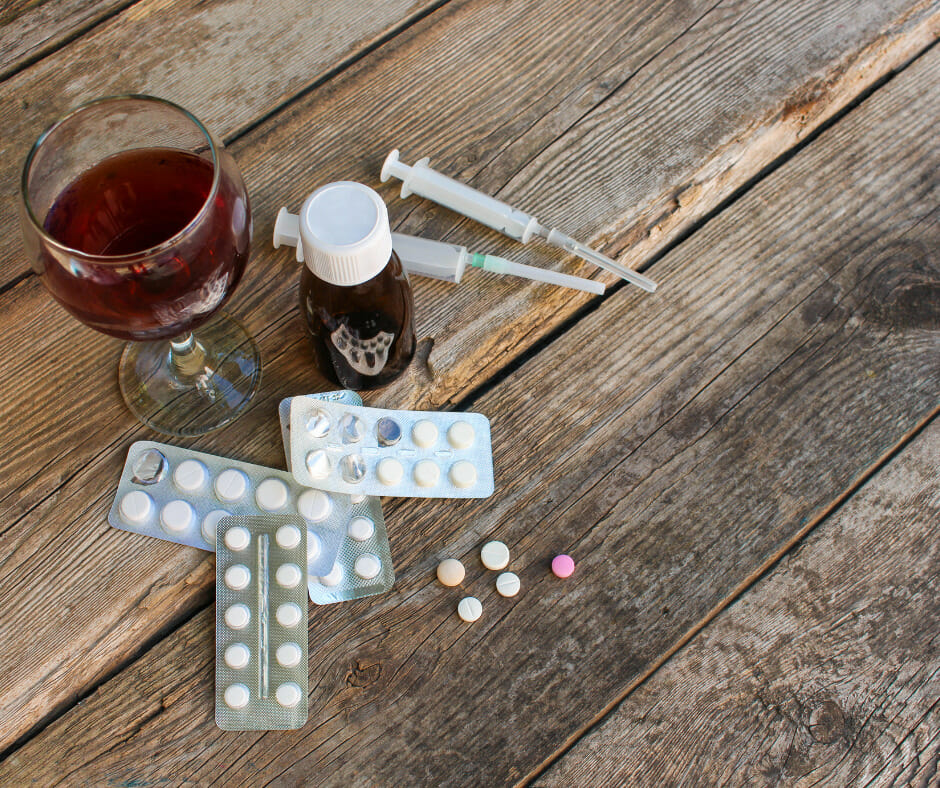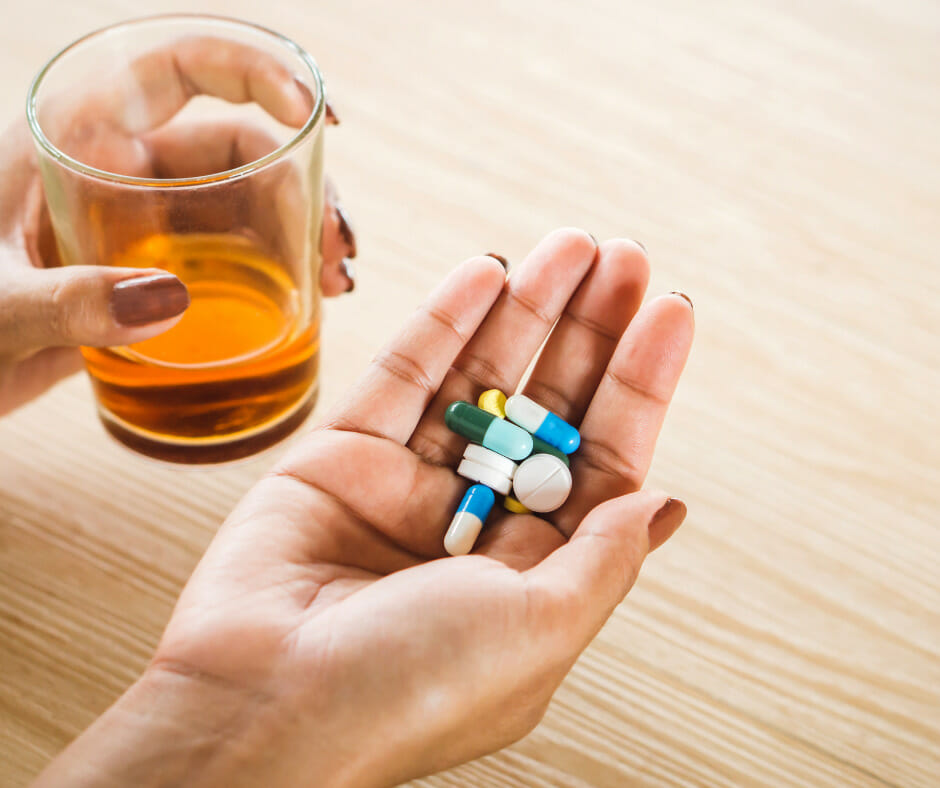Adderall and alcohol are two substances that have different effects on the body and mind. Adderall is a prescription medication commonly used to treat attention deficit hyperactivity disorder (ADHD) and narcolepsy. It contains stimulant drugs that help increase focus, attention, and control impulses. On the other hand, alcohol is a depressant that affects the central nervous system, leading to relaxation and a sense of euphoria.
Adderall consists of amphetamine and dextroamphetamine, which work by increasing the levels of certain chemicals in the brain that contribute to hyperactivity and impulse control. It is a commonly prescribed medication for individuals with ADHD to help them manage their symptoms and improve their daily functioning.
Alcohol craving, also known as alcohol use disorder or alcoholism, is a chronic condition characterized by a strong desire or compulsion to consume alcohol despite negative consequences. It is considered a substance use disorder and can lead to various physical, psychological, and social problems.
By understanding the connection between Adderall and alcohol craving and seeking appropriate help, individuals can take steps towards overcoming substance use disorders and leading a healthier, more fulfilling life.

What is Adderall?
Adderall is a prescription medication used to treat attention deficit hyperactivity disorder (ADHD) and narcolepsy. It contains amphetamine and dextroamphetamine, which are stimulant drugs that affect brain chemicals contributing to hyperactivity and impulse control.
Adderall is available in two forms: immediate-release and extended-release. The immediate-release form is taken two to three times a day, while the extended-release form is taken once a day.
How does Adderall work? Adderall increases certain brain chemicals like norepinephrine and dopamine, which help with attention and impulse control.
To ensure safety and effectiveness, it is important to take Adderall as prescribed by a healthcare professional and follow dosage instructions carefully. Higher doses or using it without a prescription can be dangerous and may cause serious side effects.
Like any medication, Adderall may cause side effects. Common side effects include increased heart rate, blood pressure, decreased appetite, and difficulty sleeping. It is crucial to discuss these side effects with a healthcare professional.
Adderall can be habit-forming, so it should always be taken as prescribed and not shared with others. Abruptly stopping Adderall use may lead to withdrawal symptoms.
It is vital to avoid taking Adderall with certain medications or substances, such as MAO inhibitors or alcohol, as it can result in dangerous interactions.
Maintaining regular check-ups with a healthcare professional is essential to monitor the effectiveness and safety of Adderall use.

What is Alcohol Craving?
Alcohol craving, also known as a strong desire to consume alcohol, can have a negative impact on physical, mental, and social well-being. It encompasses both psychological and physiological components and can be influenced by factors such as genetics, brain chemistry, and environmental triggers. Alcohol craving is often symptomatic of alcohol use disorder, which is a chronic condition wherein individuals are unable to control their drinking despite experiencing adverse effects.
The intensity and frequency of alcohol craving can vary, oftentimes being triggered by specific situations, emotions, or cues associated with alcohol consumption. Successfully managing alcohol craving necessitates a comprehensive approach that includes therapy, support groups, medication, and lifestyle modifications. Seeking professional assistance is paramount in addressing underlying issues and cultivating healthy coping mechanisms.
Jane’s personal experience vividly illustrates the impact of alcohol craving. She grappled with alcohol use disorder for an extended period of time, encountering overwhelming cravings that hindered her relationships, job performance, and overall well-being. However, with the unwavering support of her loved ones and a comprehensive treatment plan that encompassed therapy and medication, Jane triumphed over her alcohol craving and achieved sobriety. Her story serves as a testament to the fact that with the right support and determination, it is indeed possible to break free from the clutches of alcohol craving and lead a gratifying life.

The Connection Between Adderall and Alcohol Craving
The connection between Adderall and alcohol craving is a fascinating topic that brings to light the complexities of substance use. In this section, we’ll explore how Adderall affects dopamine levels and its role as a stimulant, while alcohol acts as a depressant. We’ll also delve into the intriguing realm of co-occurring substance use disorders. Prepare to uncover the interplay between these substances and gain a deeper understanding of the connection they share.
Effect of Adderall on Dopamine Levels
Adderall, a prescribed stimulant for ADHD, significantly affects dopamine levels in the brain.
Dopamine, a crucial neurotransmitter, plays a vital role in reward and pleasure pathways, motivation, and reinforcement.
When taken as directed, Adderall enhances dopamine release in the brain, according to a research published in Neuroscience & Biobehavioral Reviews, 2018.
This, in turn, improves focus, attention, and alertness for individuals diagnosed with ADHD.
Nonetheless, Adderall carries certain risks and ramifications.
Its heightened dopamine release can induce feelings of euphoria and an increased sense of motivation, which may be attractive to recreational users.
These factors could potentially lead to addiction.
Additionally, Adderall can exacerbate underlying mental health conditions associated with dopamine dysregulation, such as anxiety and depression.
Over time, or through misuse, Adderall use may result in tolerance and dependence, thus disrupting the delicate balance of dopamine in the brain.
Since the impact of Adderall on dopamine levels can differ from person to person, it is crucial for healthcare professionals to closely monitor its effects.
If you have concerns or are experiencing any adverse effects, it is recommended that you consult a healthcare professional for guidance and support.
The misuse and abuse of Adderall, particularly among college students and young adults, has raised significant concerns.
Consequently, researchers and healthcare professionals are actively studying the effects of Adderall on the brain, as well as its implications for mental health and addiction.
Understanding these effects can provide individuals with the necessary knowledge to make informed decisions regarding Adderall usage and to seek appropriate treatment when necessary.

Adderall as a Stimulant and Alcohol as a Depressant
When considering the effects of Adderall as a stimulant and alcohol as a depressant, it’s important to understand their distinct properties.
Adderall is a stimulant prescribed for ADHD. It increases dopamine and norepinephrine levels in the brain, improving focus and reducing hyperactivity.
Alcohol, on the other hand, is a depressant that slows down the central nervous system. It affects neurotransmitters like GABA, producing a sedating effect and impairing coordination and cognitive function.
The interaction between Adderall as a stimulant and alcohol as a depressant can lead to significant effects:
- Masked effects: Adderall’s stimulation can mask alcohol’s sedation, causing individuals to underestimate their level of intoxication.
- Increased risk: Combining a stimulant (Adderall) and a depressant (alcohol) strains the heart, increasing the risk of cardiovascular problems, such as elevated heart rate and high blood pressure.
- Impaired decision-making: While Adderall enhances focus and alertness, combining it with alcohol impairs decision-making and judgment, leading to risky behavior and poor choices.
Mixing Adderall (a stimulant) and alcohol (a depressant) can have severe consequences and risks. It can potentially lead to alcohol use disorder, worsen underlying mental health conditions, and increase the likelihood of accidents and injuries.
For more information, refer to our article on the relaxing effects of Adderall.
If you or someone you know is struggling with Adderall and alcohol cravings, seeking help from a healthcare professional is essential. They can provide guidance, support, and explore treatment options tailored to individual needs.
Co-occurring Substance Use Disorders
Co-occurring substance use disorders are a significant concern in the context of the connection between Adderall and alcohol craving. Individuals who are dealing with addiction to multiple substances, such as Adderall and alcohol, are particularly affected by co-occurring substance use disorders.
- Co-occurring substance use disorders present unique challenges in terms of treatment and recovery. These individuals may need specialized interventions that address both Adderall and alcohol addiction simultaneously.
- The combination of Adderall and alcohol can significantly increase the risk of substance abuse and dependence. This is due to the stimulant effects of Adderall and the depressant effects of alcohol, which can create a dangerous cycle of substance abuse.
- Co-occurring substance use disorders not only contribute to increased substance abuse but also have the potential to worsen underlying mental health conditions. People with co-occurring disorders often experience more severe symptoms of mental health disorders and may require integrated treatment approaches.
- Co-occurring substance use disorders heighten the likelihood of accidents and injuries. The impaired judgment resulting from the combined effects of Adderall and alcohol can lead to risky behaviors, accidents, and potentially fatal consequences.
- Seeking help for co-occurring substance use disorders is of utmost importance. Recognizing the issue and reaching out to healthcare professionals is the initial step towards recovery and a healthier life. It is crucial to explore treatment options such as therapy, counseling, and medication-assisted treatment to address both Adderall and alcohol addiction.
Understanding co-occurring substance use disorders is essential for individuals struggling with addiction to seek appropriate help and support. By addressing both Adderall and alcohol addiction simultaneously, individuals can enhance their chances of recovery and achieve long-term sobriety.

Effects of Combining Adderall and Alcohol
Combining Adderall and alcohol can have a significant impact on both our physical and mental well-being. In this section, we’ll explore the effects of this dangerous combination. From increased intoxication to impaired decision-making and judgment, we’ll uncover the potential risks and consequences that come with mixing these substances. It’s crucial to understand the connection between Adderall and alcohol cravings to make informed decisions about our health and safety.
Increased Intoxication
Increased intoxication is a significant consequence that arises when Adderall and alcohol are combined. Adderall, a medication used to treat ADHD, acts as a stimulant and amplifies the intoxicating effects of alcohol. This can make individuals unaware of the sedative effects of alcohol, causing them to consume larger quantities than usual. Consequently, their blood alcohol concentration (BAC) elevates, resulting in heightened intoxication.
The combination of Adderall and alcohol also impairs the ability to judge and make sound decisions. This can lead to engaging in risky behaviors like driving under the influence or participating in unsafe sexual practices. The impaired judgment caused by this combination carries severe consequences for both the individual and those around them.
It is important to note that increased intoxication is not solely a short-term effect. Repeatedly combining Adderall and alcohol can have long-term repercussions, including an enhanced risk of developing substance use disorders, worsening of underlying mental health conditions, and a greater probability of accidents and injuries.
If you or someone you know is struggling with cravings for Adderall and alcohol, seeking help and support is crucial. Acknowledging the problem and consulting with a healthcare professional are vital initial steps towards finding appropriate treatment options. With the right support and intervention, recovery is possible.
In a tragic incident last year, a young individual who combined Adderall and alcohol experienced severe consequences due to increased intoxication. While under the influence of Adderall, the individual consumed larger quantities of alcohol than usual, resulting in dangerously high levels of intoxication. This impaired their judgment and decision-making abilities, eventually leading to a car accident that caused injuries to both them and another person. This incident stands as a stark reminder of the dangers associated with combining these substances, as well as the importance of awareness and support for those grappling with cravings for Adderall and alcohol. If you or someone you know is facing similar challenges, seek help immediately.
Higher Risk of Adverse Health Effects
When Adderall and alcohol are combined, there is a higher risk of adverse health effects. One of these effects is increased intoxication, as Adderall’s stimulant properties can hide the signs of alcohol intoxication. This may lead to consuming more alcohol, which can result in alcohol poisoning and dangerous levels of intoxication.
Furthermore, combining Adderall and alcohol puts a strain on the body, increasing the risk of health issues such as heart problems, liver damage, and cardiovascular events. These risks are higher than when either substance is used alone.
Both Adderall and alcohol can impair cognitive function, affecting decision-making and judgment. This impairment raises the likelihood of engaging in risky behaviors, like driving under the influence or participating in dangerous activities.
It is crucial to note that combining Adderall and alcohol is not recommended. To ensure safety and well-being, it is advised to consult a healthcare professional before consuming alcohol while taking Adderall or any other medication.
Impaired Decision-Making and Judgment
Impaired decision-making and judgment can occur as a result of combining Adderall and alcohol. When the stimulant Adderall is combined with the depressant alcohol, it can lead to confusion and cognitive dysfunction. This combination of substances can make it difficult for individuals to evaluate risks and make rational decisions.
Consequently, people may engage in risky behaviors or make choices that have negative consequences. Research studies have indicated that the simultaneous use of Adderall and alcohol can increase impulsive behavior and diminish inhibitions. The repercussions of impaired decision-making and judgment encompass accidents, injuries, and legal problems.
It is important to note that the likelihood of making poor decisions is greater when both substances are used together rather than individually. It is imperative to acknowledge the potential for impaired decision-making and judgment when using Adderall and alcohol concurrently. Seeking assistance from a healthcare professional is crucial for individuals who are grappling with the combination of these substances. Treatment options, such as therapy and support groups, can aid individuals in addressing the root causes contributing to impaired decision-making.

Consequences and Risks of Adderall and Alcohol Craving
Understanding the consequences and risks of Adderall and alcohol craving is crucial. From the development of alcohol use disorder to the worsening of underlying mental health conditions, and the increased likelihood of accidents and injuries, this section uncovers the alarming implications. With facts and backed-source names, we shed light on the connection between Adderall and alcohol and the potential dangers that individuals may face. The vital information within these sub-sections will illuminate the potential risks associated with these cravings.
Development of Alcohol Use Disorder
The development of alcohol use disorder is a serious concern when combining Adderall and alcohol. Alcohol use disorder, also known as alcoholism, is a chronic condition characterized by compulsive and uncontrolled alcohol consumption, which negatively impacts physical and mental health, as well as social and occupational functioning.
Regularly combining Adderall, a stimulant medication for treating attention deficit hyperactivity disorder (ADHD), with alcohol can increase the risk of developing alcohol use disorder. Adderall’s stimulant effects can mask the sedative effects of alcohol, enabling individuals to consume larger amounts without feeling intoxicated.
Additionally, the combination of Adderall and alcohol can lead to dependence. People may rely on Adderall to counteract alcohol’s depressant effects, resulting in co-occurring substance use disorders.
Research has shown that, “those with attention-deficit/hyperactivity disorder (ADHD) have an increased risk for addiction disorders like alcoholism and substance abuse.” (Attention-Deficit/Hyperactivity Disorder in Relation to Addictive Behaviors: A Moderated-Mediation Analysis of Personality-Risk Factors and Sex, Davis et al., 2015)
Recognizing the signs of alcohol use disorder and seeking help is crucial for anyone struggling with this issue. Therapy and support groups are treatment options that can help individuals overcome alcohol use disorder and address underlying mental health conditions.
Worsening of Underlying Mental Health Conditions
Combining Adderall and alcohol can exacerbate underlying mental health conditions. Using these substances concurrently can have adverse effects on mental well-being. Substance use disorders, including Adderall and alcohol, have the potential to worsen existing mental health conditions and intensify symptoms.
The interaction between Adderall and alcohol can amplify the impact of both substances on the brain. As a stimulant, Adderall increases dopamine levels and can further deteriorate underlying mental health conditions like anxiety and depression. Conversely, alcohol, being a depressant, can also aggravate these conditions.
The combination of Adderall and alcohol impairs decision-making and judgment, making it challenging to effectively manage and cope with mental health symptoms. Consequently, this increases the likelihood of engaging in risky behaviors, impulsivity, and harmful actions.
Moreover, individuals with underlying mental health conditions may be more susceptible to developing an alcohol use disorder when consuming Adderall and alcohol together. The mixture of these substances enhances cravings and elevates the risk of addiction and dependence.
In the event of a worsening of underlying mental health conditions, it is crucial to acknowledge the issue and seek assistance from a healthcare professional. They can provide guidance, support, and explore treatment options that address both substance use and mental health concerns.
Increased Likelihood of Accidents and Injuries
The combination of Adderall and alcohol significantly increases the likelihood of accidents and injuries. Understanding the risks associated with this combination is crucial for ensuring safety.
- Mixing Adderall, a stimulant, with alcohol, a depressant, can have unforeseeable effects on the body. Adderall can mask the sedative effects of alcohol, leading individuals to consume more alcohol than usual. This raises the risk of alcohol poisoning and overdose.
- Being under the influence of both substances can severely impair coordination, balance, and motor skills. This makes individuals more susceptible to accidents, such as falls, car crashes, or other injuries.
- Both Adderall and alcohol can impair judgment and decision-making abilities, resulting in risky behavior like drunk driving or engaging in hazardous activities.
- Combining Adderall and alcohol also elevates the risk of developing an alcohol use disorder. The stimulating effects of Adderall can overshadow the sedative effects of alcohol, increasing the ease of consuming larger quantities and escalating the risk of alcohol dependency.
To prevent these risks and ensure safety, it is crucial to refrain from mixing Adderall and alcohol. If prescribed Adderall, it is important to follow the recommendations of your healthcare professional and abstain from consuming alcohol. Seek help if you or someone you know is struggling with substance use or addiction. Recovery and support programs can offer guidance and resources to overcome these challenges.
Remember, the heightened likelihood of accidents and injuries associated with combining Adderall and alcohol should not be underestimated. Prioritizing health and safety is essential for making well-informed decisions regarding substance use.
Seeking Help: Treatment and Support
Seeking help for Adderall and Alcohol craving is crucial in overcoming the challenges posed by this connection. In this section, we will explore various avenues for treatment and support. From recognizing the problem to engaging in an open conversation with a healthcare professional, we will delve into the steps to take. Additionally, we will examine different treatment options available, providing you with valuable insights into finding the right path towards recovery.
Recognizing the Problem
Recognizing the problem of combining Adderall and alcohol is crucial for ensuring the safety and well-being of individuals. It is important to be aware of signs and symptoms that indicate a problem:
- Changes in behavior: Pay attention to significant changes such as increased irritability, mood swings, or sudden secretive behavior, which can be indicators of the problem being recognized.
- Increased tolerance and dependence: If a person needs higher doses of Adderall or alcohol to achieve desired effects, it may indicate the recognition of tolerance and dependence as part of the problem.
- Neglecting responsibilities: Individuals struggling with the combination may start neglecting work, school, or home responsibilities, underscoring the problem recognized.
- Social withdrawal: Notice if there is a significant withdrawal from social activities and a desire to spend time alone or with a specific group of people who also abuse substances, indicating the problem being recognized and the need to isolate oneself from others.
- Health issues: Physical symptoms like insomnia, weight loss, increased heart rate, or gastrointestinal problems may indicate a problem that has been recognized and needs attention.
Recognizing the problem is the first step towards seeking help and finding support for recovery. Substance abuse can have severe consequences for physical and mental health.
Fact: According to 2020 National Survey on Drug Use and Health by SAMHSA, in 2020, approximately 5.1 million people aged 12+ misused prescription stimulants, and over 28.3 million people aged 12 or older had an alcohol use disorder in the United States.
Talk to a Healthcare Professional
When it comes to the connection between Adderall and alcohol craving, it is important to talk to a healthcare professional. Seeking guidance from a healthcare professional can provide valuable insight and personalized advice. Here are some reasons to have a conversation with a healthcare professional:
- Expert knowledge: Healthcare professionals possess extensive knowledge about the effects of Adderall and alcohol. They can provide accurate information and educate you about the risks and potential consequences of combining these substances.
- Individual assessment: A healthcare professional will evaluate your unique circumstances, medical history, and any underlying conditions. This assessment can help determine the impact that Adderall and alcohol may have on your specific situation.
- Risk identification: Healthcare professionals can identify potential risks and complications associated with combining Adderall and alcohol. They can help you understand the specific dangers and offer advice on how to minimize harm.
- Treatment options: If you are experiencing alcohol craving or struggling with substance use disorders, a healthcare professional can recommend appropriate treatment options. They can guide you towards therapy, prescribe an ADHD medication with least side-effects, support groups, or specialized addiction programs.
- Monitoring and support: Regular check-ins with a healthcare professional can help monitor your progress and provide ongoing support. They can help you navigate any challenges or difficulties you may encounter during your recovery journey.
Remember, seeking help from a healthcare professional is essential in understanding and addressing the connection between Adderall and alcohol craving. From expert knowledge to personalized guidance, they can assist you in making informed decisions for your well-being.
True history: Jane, a college student, was prescribed Adderall for her attention deficit hyperactivity disorder (ADHD). She also enjoyed socializing and occasionally consumed alcohol. Concerned about the potential risks of combining Adderall and alcohol, she decided to talk to a healthcare professional. After discussing her situation with a knowledgeable healthcare professional, Jane gained a better understanding of the effects and potential dangers associated with the combination. She received personalized advice on managing her ADHD symptoms effectively while avoiding the risks of alcohol interaction. The healthcare professional also provided resources for support groups and therapy to address any underlying issues contributing to her alcohol cravings. Jane’s decision to seek guidance from a healthcare professional allowed her to make informed choices and prioritize her long-term well-being.
Exploring Treatment Options
To address Adderall and alcohol craving, there are several treatment options to consider:
- Behavioral Therapy: This therapy can effectively treat substance use disorders. Therapists work with individuals to identify triggers and develop coping strategies to manage cravings and prevent relapse.
- Medication-Assisted Treatment: Medications, like naltrexone, can be prescribed to help manage cravings and reduce the desire for alcohol by blocking its euphoric effects.
- Support Groups: Joining Alcoholics Anonymous (AA) or SMART Recovery can provide community and support in the recovery journey, allowing individuals to share experiences, gain insights, and receive encouragement.
- Individual Counseling: Working with a counselor or therapist on a one-on-one basis helps understand the factors contributing to addiction and develop personalized recovery strategies.
- Lifestyle Changes: Making positive changes in diet, exercise, stress management, and sleep can greatly reduce cravings and promote overall well-being.
- Holistic Approaches: Incorporating practices like yoga, meditation, acupuncture, or art therapy can reduce stress, promote relaxation, and enhance overall well-being.
Remember, the choice of treatment options depends on individual circumstances. Consulting a healthcare professional is crucial for personalized guidance. Exploring different approaches increases the likelihood of finding an effective treatment strategy for Adderall and alcohol craving.
Frequently Asked Questions
What is the connection between Adderall and alcohol craving?
There is a connection between Adderall and alcohol craving, especially in individuals with a co-occurring disorder. Adderall, a medication used to treat ADHD, can increase alertness, while alcohol is often used as a social lubricant or relaxation aid. This combination can lead to a dangerous desire for more alcohol, as Adderall can mask the effects of alcohol and give individuals a false sense of sobriety.
Why is binge drinking a risk factor for individuals with ADHD?
Binge drinking poses a particular risk for individuals with ADHD. Research suggests that individuals with ADHD are more likely to engage in impulsive actions and have difficulty controlling their behaviors due to decreased inhibition caused by alcohol use. This makes individuals with ADHD more susceptible to consuming heavy quantities of alcohol and engaging in binge drinking behavior.
What are the dangerous effects of mixing Adderall and alcohol?
Mixing Adderall, a stimulant used to improve cognitive performance, with alcohol, a central nervous system depressant, can have harmful effects on the body. The combination can lead to increased heart problems, high blood pressure, liver damage, and an increased risk of alcohol poisoning. Suppressed appetite, dehydration, increased risk of seizures, and impaired coordination are also dangerous effects that can result from this combination.
Can using Adderall for recreational purposes lead to alcohol addiction?
Yes, misusing and abusing Adderall for nonmedical reasons, such as using it as a study aid or recreationally, can increase the risk of alcohol addiction. Adderall stimulates neurotransmitters in the brain, including dopamine and norepinephrine, which can enhance the effects of alcohol. This combination can lead to an increased craving for alcohol and the development of addiction.
What should be done if someone is experiencing cravings for both Adderall and alcohol?
If someone is experiencing cravings for both Adderall and alcohol, it is important to seek professional help as soon as possible. This dual diagnosis of a co-occurring disorder requires specialized treatment that addresses both the addiction to alcohol and the underlying ADHD. Professionals, such as those at our Charleston outpatient recovery center, can provide a safe and supportive environment for lasting recovery.
What are the health risks of long-term Adderall and alcohol use?
Long-term use of Adderall and alcohol can have serious health consequences. Alcohol misuse can lead to liver damage, heart issues, impaired breathing, and various forms of cancer. Adderall use can cause high blood pressure, heart palpitations, insomnia, and a suppressed appetite. The combination of Adderall and alcohol can increase the risk of heart problems, high blood pressure, liver damage, and alcohol poisoning. Seeking professional help is essential to address these health risks and achieve lasting recovery.









